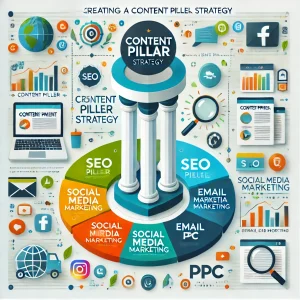Understanding the Importance of Marketing Strategies
Marketing strategies are the backbone of any successful business. They serve as a blueprint for how a company will reach its target audience and achieve its business objectives. A well-structured marketing strategy can help businesses:
- Identify their target audience – Understanding who your customers are and what they need is crucial for creating effective marketing campaigns.
- Improve brand awareness – A strong marketing strategy helps in making your brand visible and recognizable among potential customers.
- Increase sales and revenue – Effective marketing strategies directly contribute to business growth by attracting new customers and retaining existing ones.
- Establish a competitive edge – In a crowded marketplace, marketing strategies help differentiate your brand and highlight its unique selling points.
For more insights on marketing strategies, check out our guide on Crafting Engaging Content Marketing.
Key Elements of Building Effective Marketing Strategies
To build effective marketing strategies, businesses need to focus on several core elements that influence the success of their campaigns. These elements include:
- Market Research and AnalysisThe foundation of any successful marketing strategy is thorough market research. Understanding market trends, customer preferences, and competitor behavior is essential for crafting marketing strategies that resonate with the target audience. This research allows businesses to make informed decisions and allocate resources more effectively.
- Customer SegmentationOne of the most innovative approaches to building effective marketing strategies is customer segmentation. By dividing your target market into distinct segments based on demographic, geographic, psychographic, or behavioral factors, you can create personalized marketing campaigns that speak directly to the needs and preferences of each group. This approach helps increase engagement and conversion rates.
- Creating a Unique Value Proposition (UVP)A strong UVP is a critical component of building effective marketing strategies. It defines what makes your brand unique and why customers should choose your product or service over competitors. Your UVP should be clear, concise, and communicate the benefits your customers will receive from your offerings.
- Leveraging Digital Marketing ChannelsIn the digital age, it’s essential to integrate digital marketing channels into your strategy. From social media platforms to email marketing, SEO, and content marketing, businesses must adopt a multichannel approach to reach their audience where they spend most of their time. Building an effective digital marketing strategy involves understanding the strengths of each channel and using them in conjunction to maximize results.
For more details on how to leverage marketing channels, read our article on Understanding the Marketing Mix.
Innovative Approaches to Building Effective Marketing Strategies
- Personalization at ScalePersonalization has become one of the most effective ways to engage customers. By using data-driven insights, businesses can create personalized marketing messages and offers that resonate with individual customers. Personalized experiences increase customer satisfaction and loyalty, driving repeat business.
For instance, e-commerce brands like Amazon use advanced algorithms to suggest products based on a customer’s browsing and purchasing behavior. Similarly, email marketing campaigns can be tailored to specific customer segments, offering promotions and content that align with their preferences.
- Content Marketing as a Strategic ToolContent marketing has emerged as a powerful tool for businesses looking to connect with their target audience. By providing valuable, informative, and engaging content, businesses can establish themselves as thought leaders in their industry and build trust with potential customers. Blog posts, videos, podcasts, and infographics are just a few types of content that can be used to inform, educate, and entertain your audience.
Learn more about crafting compelling content by visiting our Guide to Crafting Engaging Content Marketing.
- Influencer Marketing and PartnershipsInfluencer marketing has gained significant traction over the past few years, especially in the social media landscape. Collaborating with influencers who have a strong following and influence in your industry can amplify your brand’s reach and credibility. Influencers act as trusted voices, and their endorsement can lead to higher engagement rates and increased brand awareness.
- Data Analytics and Artificial Intelligence (AI)In the age of big data, businesses can no longer afford to rely on gut feelings when making marketing decisions. Data analytics and AI tools help marketers gather valuable insights about their customers’ behavior, preferences, and purchasing patterns. By analyzing this data, businesses can create highly targeted campaigns that are more likely to succeed.
AI-powered tools can also automate various aspects of marketing, from social media management to email marketing and customer support. This helps businesses save time and resources while delivering more personalized experiences to customers.
- Social Media EngagementSocial media has revolutionized the way businesses interact with their customers. Platforms like Instagram, Facebook, Twitter, and LinkedIn provide businesses with the opportunity to engage with their audience in real time. Innovative marketing strategies now include interactive content such as polls, live videos, and user-generated content campaigns that encourage customer participation and foster a sense of community around the brand.
- Video MarketingVideo content has become a dominant form of media consumption, with millions of users watching videos daily on platforms like YouTube, TikTok, and Facebook. Incorporating video marketing into your marketing strategies can significantly boost engagement and brand visibility. Whether it’s product demos, customer testimonials, or behind-the-scenes footage, videos help convey messages more effectively than text or images alone.
Explore more about identifying your target audience in our article on Practical Activity: Identifying Target Audiences.
- Omnichannel MarketingCustomers today expect a seamless experience across all touchpoints, whether online or offline. Omnichannel marketing involves creating a unified customer experience across multiple channels, including websites, mobile apps, physical stores, and social media platforms. By integrating these channels, businesses can ensure that customers have a consistent and personalized experience at every stage of their journey.
- Customer Retention StrategiesWhile acquiring new customers is essential, retaining existing ones is equally important. Innovative marketing strategies now focus on building long-term relationships with customers through loyalty programs, personalized offers, and exceptional customer service. Satisfied customers are more likely to become repeat buyers and brand advocates, helping to increase customer lifetime value.
Measuring the Success of Your Marketing Strategy
No marketing strategy is complete without a solid measurement framework. By regularly tracking and analyzing key performance indicators (KPIs), businesses can determine whether their marketing strategies are working as intended. Metrics such as website traffic, conversion rates, social media engagement, and return on investment (ROI) provide valuable insights into the effectiveness of a campaign.
Tools like Google Analytics, HubSpot, and social media analytics platforms make it easier for businesses to measure the success of their campaigns in real-time and adjust their strategies as needed.
Conclusion
Building effective marketing strategies is an ongoing process that requires creativity, innovation, and a deep understanding of customer needs. By leveraging data, adopting digital marketing tools, and personalizing the customer experience, businesses can create marketing strategies that resonate with their target audience and drive long-term success. Whether you’re a small business or a global brand, these innovative approaches can help you stay ahead of the competition and achieve your marketing goals.
For insights into successful marketing strategies from top brands, explore real-world examples from leading businesses that have mastered the art of building effective marketing strategies.



Leave a Reply